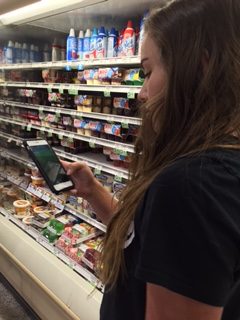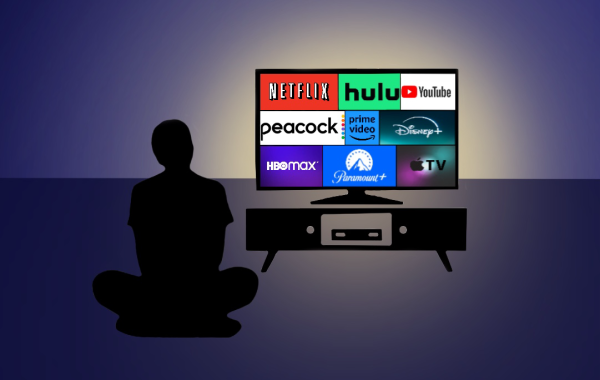Gotta catch’em all

photo by Bryson Turner
Freshman Aly Schwartz plays Pokémon Go as she shops in Publix with her mother. Schwartz had been playing the game ever since it was recommended to her over social media.
Freshman Aly Schwartz strolled down the dairy section of Publix, glancing at her phone every few seconds. Contrary to popular beliefs, she is not texting or checking social media. She is playing the phenomenon that is sweeping the globe, Pokémon Go.
Suddenly, a new Pokémon appeared on her screen, a Pidgey. She tapped the tiny bird Pokémon on her iPhone’s screen, and it shifts from a general street map of the area, to show the Pidgey actually in Publix, perched on the refrigerated shelves.
Pokémon Go is a game that uses augmented reality, which, according to the New York Times, “fuses digital technology,” in this case, a Pokémon, “with the physical world.”
Schwartz, like many, started playing the game once they heard about it from their friends or on social media. Others, like sophomore Vangeli Tsompanidis, has been a fan of Pokémon his entire life and eagerly awaited the game’s release since it was announced on September 10th, 2015, to when it was released in the U.S. on July 6th, 2016.
“Ever since I was a kid I have always wanted to be a Pokémon trainer,” Tsompanidis said. “[Now], because of Pokémon Go, my dreams have materialized.”
The Pokémon franchise has gained many American fans since the North American release of its first games, Pokémon: Red and Pokémon: Blue, in 1996. It only intensified with the release of an English dubbed anime in mid-1997, with a theme song many of its watchers still remember by heart, and movies based off the anime that have been made annually since 1998.
One of the main developers of the Pokémon games, Nintendo, have become a flagship franchise for the company, alongside Mario, Zelda, and Metroid. Interestingly however, Pokémon Go is not the work of Nintendo. The game was actually created and developed by a relatively new company, Niantic Inc., which started out as a subsidiary of Google, before spinning out in 2015. Pokémon Go is their first game after parting with Google.
This is the Pocket Monsters’ second mobile game, after the release of Pokémon Shuffle Mobile in August 2015. Needless to say, the game did not generate as many players as Pokémon Go.
The game has become such a phenomenon, that it surpassed Twitter, and other social media networks, in terms of daily active users, on Android devices, on July 11th. In other words, more people were playing Pokémon Go, than scrolling through their Twitter feed.
“[It’s] shocking, [because] it seems everyone, these days, has Twitter,” Schwartz said.
Pokémon Go has become a unique gaming experience, since it makes players have to physically travel across the land and search far and wide to find the pocket monsters, as well as to battle opponents at real life gyms and stock up on supplies at Pokéstops, which were placed by the game developers at certain locations, such as monuments, parks, or even pizza joints.
Pizza joints can even be a humorous place for a Pokémon to appear, which is exactly what happened on a trip to New York City for senior Kobe Delgado.
“[The Pokémon] popped up right on the cheese pizza while I was trying to order,” Delgado said.
The pocket monsters have also given a new reason for individuals or groups of friends to get outside and get active, like sophomore Rosa Mentlick.
“There’s a Pokéstop near Starbucks, just past Hagerty,” Mentlick said.
However, for every humorous situation Pokémon Go has caused, there are some that aren’t so humorous, such as players being robbed, finding dead bodies, or run over by cars.
However, this hasn’t deterred some players from playing safe and responsibly, like junior Morgan Morarend.
“If you’re going to check and play Pokémon Go, don’t walk and do it. You should stop to play it,” Morarend said.
Pokémon Go has become a game that attracts longtime fans of a timeless franchise, as well as the average mobile gamer, and introduces a new form of gaming, augmented reality, into mainstream audiences in a way that no game has before. Shattering download records left and right, it has become the best like no game ever was.

Your donation will support the student journalists of Hagerty High School. We are an ad-free publication, and your contribution helps us publish six issues of the BluePrint and cover our annual website hosting costs. Thank you so much!






